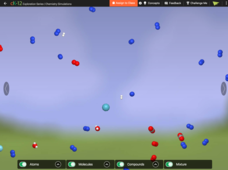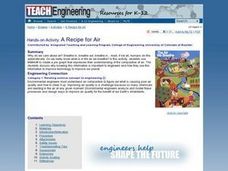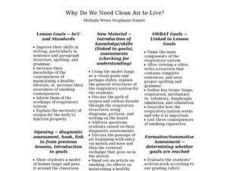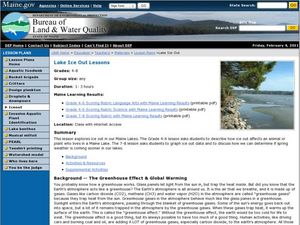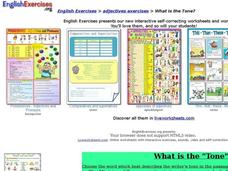CK-12 Foundation
Air Matters
What makes up the air we breathe? Young scientists explore the atoms and molecules in the air. An interactive lesson allows individuals to watch the movement of the particles in the air and change the makeup from a mixture to a compound....
Baylor College
Air and Breathing
Blow some bubbles and learn how living things need air in the eighth lesson of this series. Young scientists investigate this important gas by observing bubbles and monitoring their own breathing. A simple and fun activity that raises...
Curated OER
Take a Deep Breath: Air Today, Air Tomorrow
This is the introductory lesson in a series about air quality. Why is it so important that we breathe clean air? How can we make sure we're keeping our air clean? A discussion is the central idea of the lesson, and example questions are...
Curated OER
A Recipe for Air
Young scholars create a pie graph using M&Ms to demonstrate the composition of air. They label each section of the graph, and list the fractions from largest to smallest.
Curated OER
The Air We Breathe
Students discover the cuases of pollution. They investigate different pollutants that exist. Stsudents research technologies developed by engineers to reduce the amounts of air pollution. Upon completion of assigned activities,...
Curated OER
Every Breath You Take
Students explore the nature of the air we breathe by observing petri dishes that have accumulated particulate matter from the atmosphere. Students make mathematical calculations and inferences about the effect of this matter on...
Curated OER
Why Do We Need Clean Air to Live? - Biology Teaching Thesis
High schoolers name the main components of the respiratory system. They write a reaction that contains complete sentences, and uses proper spelling and grammar, after viewing a video. Students define the following terms: lungs,...
Curated OER
Why Study Air Pollution?
Eighth graders study air pollution and identify some causes, effects and solutions. In this air pollution lesson students complete several activities.
Curated OER
Is It Breathable?
Students explore air quality. In this environmental lesson, students observe a simulation of air pollution by blowing into a jar (with a straw) that has chalk dust. Students discuss how air quality can effect the way we breathe.
Curated OER
I Breathe What?
Middle schoolers participate in an experiment in which they gather and examine particiles in the air. They place pollution detectors at different locations and identify problem areas. They discuss how engineers can use this type of...
Curated OER
How Plants Help Us Breathe
Third graders discuss how humans breathe and how plants help us to stay alive. In groups, they identify and label the different parts of plants and describe their functions. They compare and contrast the ways plants and animals breathe...
Curated OER
What's Hiding in the Air?
Fifth graders conduct experiments to study the effects of invisible air pollutants including one with a bean plant. They examine methods of invisible air pollutants.
Curated OER
Breathing
When learning about the respiratory system, how do learners know what is important? One way is to use a self-assessment or study like the one found here. While the formatting could use some work, the concepts are solid. Depending on your...
American Museum of Natural History
Microbes Coloring Book and Scavenger Hunt
Coloring pages showcase microbes—bacteria, viruses, and protists. Scholars have the option to download a coloring book and scavenger hunt or color the page directly on the computer. Three paragraphs describe each microbe.
Curated OER
Circulatory and Respiratory Systems
Eighth graders are able to write a paragraph describing each system based on the information retrieved in class. They trace a route from Holly Springs, MS to Greenwood using the maps that they were given. Students discuss the role of...
Curated OER
What is Everything Made of?
Learners observe a demonstration on how we see space between water molecules. In this experimental lesson students discover what elements make up the things around them and discuss what they learned.
Curated OER
Lake Ice Out Lessons
Young scholars explore the greenhouse effect. In this environment instructional activity, students describe how "ice out" affects animals and plants who live in a Maine lake. Young scholars graph "ice out" data and make predictions...
Curated OER
How Do You Dew?
Students examine how the processes of condensation and evaporation occur. They describe the relationship between heat energy, evaporation and condensation of water on Earth. They give examples of the processes of evaporation and...
Curated OER
What is the "Tone"?
In this English learning exercise, learners choose a word to fit the tone. Students choose a word from multiple choices that describe the tone of the writer of a short passage.
Curated OER
Charge It!
Pupils complete an experiment using balloons to help them examine the concept of static electricity. They discover how engineers use this information to create better air filters for homes. They describe how to charge an insulator as...
Curated OER
Biodiversity Bird Hunt
Students examine the influence of biodiversity on human culture through the use of birds. They brainstorm words that come to mind when they think of human cultures. They describe ways that human culture and biodiversity are linked.
KOG Ranger Program
How Things Burn
What is the fire triangle? Young ranger learn about the three elements needed to start a fire and keep it going (heat sources, fuel sources, and oxygen) with a class demonstration involving a candle in a jar.
Curated OER
Fighting Back!
Fifth graders inspect the basic functions of the immune system and determine how viruses and bacteria invade the immune system. They also explore what happens to the immune system in outer space.
Curated OER
TE Lesson: Fighting Back!
Students examine the roles of the immune system in keeping the body healthy. They see how engineers contribute to this process by creating antibiotics, and vaccinations. They discuss how an astronauts' immune system may be suppressed...


